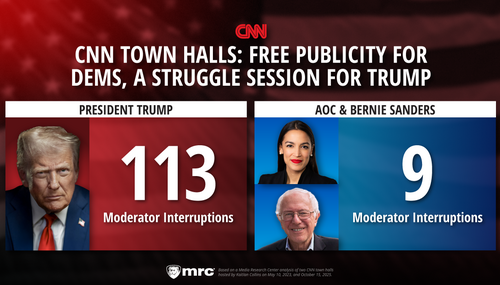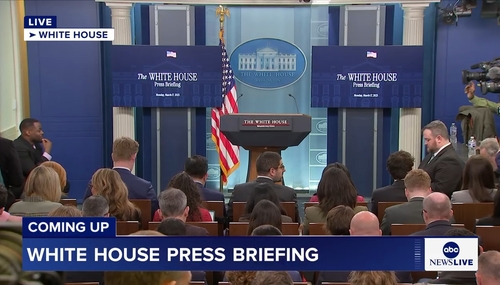Thinking of learning a new language? Try English – broadcast media style. Specifically, try abortion-reporting speak – a tongue as notable for the words it doesn’t use as those it does.
This year’s annual March for Life, this Friday, Jan. 25th, marks the 40th anniversary of the Roe v. Wade decision. And, though you might think it would be difficult to talk about something called the March for Life without using the word “life,” the broadcast networks have shown the utility of abortion-reporting speak. In the past 10 years, 91 percent of ABC, NBC, and CBS anchor reports on the March for Life and Roe v. Wade failed to mention the word, “life.”

The other 20 reports employed a variety of alternate descriptions for the March for Life and pro-life activists. The March and counter-demonstrations were rallies sponsored by both opponents and supporters of Roe v. Wade, according to NBC’s Brian Williams on Jan. 24, 2005 and his colleague Ann Curry on Jan. 22, 2007. The marchers were “opponents” (ABC’s Jake Tapper, Jan. 23, 2006), and “anti-abortion activists” (NBC’s Tom Brokaw, Jan. 22, 2003) rather than “pro-lifers” or “pro-life marchers,” as they self-describe.
The linguistic selections are far from unconscious. A recent interview by NBC’s Andrea Mitchell illustrated the “life” language prejudice pervading broadcast media. When Republican strategist Juleanna Glover identified herself as “deeply pro-life” in an interview, Mitchell interrupted, “Well, what I would call anti-abortion,” and added, “to use the term that I think is more value neutral.”
And the language is institutionalized. Journalists should “Use anti-abortion instead of pro-life andabortion rights instead of pro-abortion or pro-choice,” according to The Associated Press (AP) Stylebook’s 44th edition. Instead of making the argument about life and death or choice and constraint, AP advocates for the flat, procedural term: abortion.
National Public Radio (NPR) joined news organizations such as NBC, CBS, CNN and The New York Times in adopting the AP terminology in a controversial move three years ago. NPR’s managing editor, David Sweeney, explained, “This updated policy is aimed at ensuring the words we speak and write are as clear, consistent and neutral as possible.”
“We call them pro-abortion rights and anti-abortion rights because it's the right to abortion that we're talking about," Linda Mason, a CBS senior vice president, told NPR’s Alicia C. Shepard. Uttering the words, “pro-life,” according to Mason, “leaves people scratching their heads.”
The Washington Post and The New York Times also center the discussion on the procedure rather than life to the extent of introducing interviewee Richard Doerflinger as “Associate Director of Anti-Abortion Activities for the U.S. Conference of Catholic Bishops” when his proper title was “Associate Director of Pro-Life Activities.” Perhaps readers should be grateful he wasn’t dubbed “Associate Director of Activities Opposing Voluntary Pregnancy Termination.”
Why the insistence on a rigid terminology? A liberal women’s publication, Bust Magazine, hit the nail on the head: “The problem with “pro-life” is what it implies about the rest of us: that if you’re not pro-life, you’re automatically pro-death” – or, rather, such terminology would explain the position of those “anti-abortionists.” Georgetown University Linguistics Professor Andrea Tyler expressed to NPR that, “Being the opposite of pro-choice is not as bad as being the opposite of pro-life." Even Planned Parenthood favored the elimination of pro-life/pro-choice “labels,” because the terms make abortion appear as a black and white issue.
Jezebel’s Katie J.M. Baker wanted to erase the pro-life/pro-choice terminology as well, and introduced partisan politics to the discussion. “The terms become even more meaningless,” said Baker, “when Republicans claim how 'pro-life' they are while also opposing gun control...” Pro-life in the abortion debate, but pro-choice on guns! Now that could be confusing.
National Abortion and Reproductive Rights Action League (NARAL) Communications Director Tarek Rizk wants the word “choice” kept in the abortion argument, however. “We believe the language of 'choice' is a powerful tool,” says Rizk, “to help people understand what is at risk and what we're fighting so hard to protect:” the personal situations women must face.
When switching pro-life/pro-choice terminology for anti-abortion/abortion rights, conservative columnist La Shawn Barber said, “Who wants to be against rights, right?” She demanded the media frame language from a revolutionary, contradictory, angle:
- Refer to abortion supporters as “right to life opponents”
- Refer to gun control supporters as “gun rights opponents”
- Refer to “hate speech” backers as “speech rights opponents”
- Refer to racial preferences advocates as “constitutional rights opponents”
Now wouldn’t that make for a different world? A new discovery of life’s languages.




